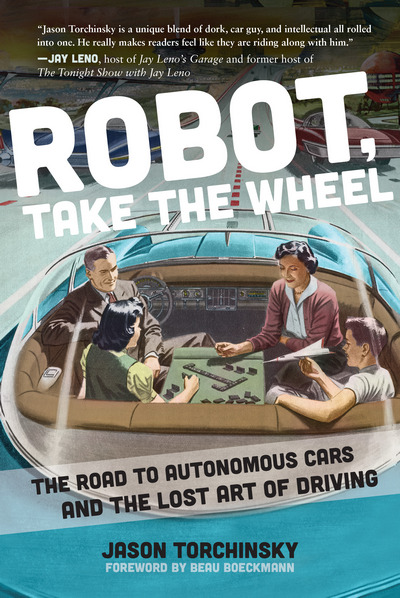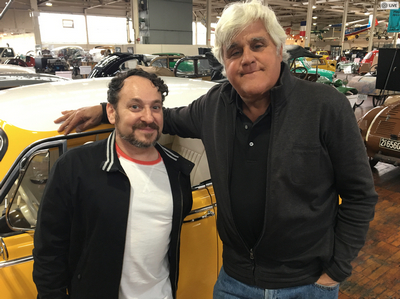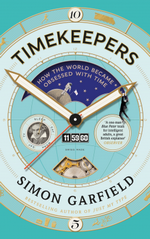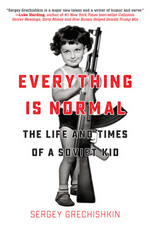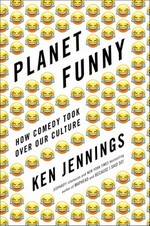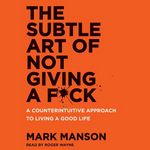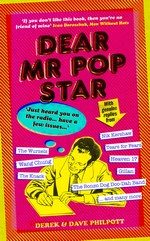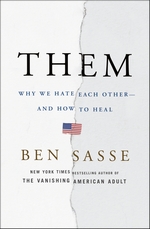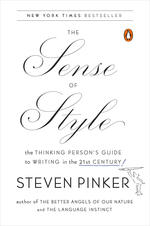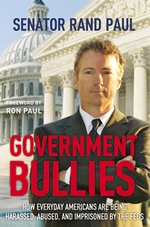by Simon Garfield
eARC, 368 pg.
Canongate Books, 2018
Read: February 16 – 23, 2018

Time, once passive, is now aggressive. It dominates our lives in ways that the earliest clockmakers would have surely found unbearable. We believe that time is running away from us. Technology is making everything faster, and because we know that things will become faster in the future, it follows that nothing is fast enough now. . . But the strangest thing of all is this: if they were able, the earliest clockmakers would tell us that the pendulum swings at the same rate as it always has, and the calendars have been fixed for hundreds of years. We have brought this cauldron of rush upon ourselves. Time seems faster because we have made it so.
I remember a few books pretty distinctly from my childhood — particularly those I read that were my first forays into “grown up” books — Ian Fleming, Erle Stanley Gardner, Mario Puzo, Richard Hooker, and so on. The first non-fiction book that I remember trying along those lines was Tom Wolfe’s The Right Stuff, which may have ruined me for a lot of the non-fiction that would follow (we can talk about my discernment later). It was funny, it taught me a lot, it made me think of the early US Space Program a little differently than what I’d been taught, and it was told in Tom Wolfe’s voice (which I love to this day). But it cemented the way I look at non-fiction books. Today, when it comes to non-fiction reads, there are a number of ways I tend to judge them (rightly or wrongly) — first (always first): Is it well-written? I’m not saying it has to sound like Wolfe, but does the writer know what he’s doing? Even if I end up learning a lot from a book, if it’s not well-written, I’m not going to like it. Secondly, is it informative? Do I actually learn something, or is it a re-hash of things that any number of books have said (do we really need that many biographies of Abraham Lincoln?)? Thirdly, does it make me think of something in a new way, or challenge my preconceptions (does this examination of Don DeLillo make me re-think White Noise? (I know of no book like this, but would love to read one)). Fourth, this is not essential — but is the book entertaining? It gets bonus points for that.
Simon Garfield’s Timekeepers, clears the bar for every one of these standards. Since he does it more succinctly than I could, I’ll let Garfield sum up the book:
This is a book about our obsession with time and our desire to beat it. . . The book has but two simple intentions: to tell some illuminating stories, and to ask whether we have all gone completely nuts.
He begins with telling the well-known (at least in brush strokes) story about the invention of time zones — but man, did I not understand really how this came about. Then he covers the experiments with the calendar, the clock, etc. tried following the French Revolution (and how some of those experiments live on). We get a couple of chapters on time and the cinema. Music (Beethoven, The Beatles, recording and more), photography, filibustering, the work day, and other sundry topics are covered as well. You can’t forget watch-making, watch-marketing, watch-design, watch-capabilities, watch-symbolism, and a few other watch-related notions that I can’t think of at the moment.
Let’s get to the writing itself. Garfield has a way with words — the number of sentences that I highlighted because of his use of the language is pretty high. If I quoted every one that I wanted to, this post would quickly move into the tl;dr range — and into the copyright infringement range not long after that. It wasn’t just his style, the book simply displays some well-crafted writing. It’s not perfect — but it’s good. I’ll freely admit that not every topic he covered really interested me, but his writing kept me reading — and I was rewarded pretty frequently. Even when my interest waned, his writing would stand out here and there so I could appreciate the how he said it, even if the what didn’t interest me. Rarely, the topics that did grab me would have a paragraph or so that didn’t rise to that level, however. I’m not going to go into specifics on this point, though — I didn’t bother to note those, and I bet that comes down to taste and others won’t think of those passages the same way, and they were brief moments, so they didn’t detract from the whole.
Did I learn something from the book? Much more than I expected to. The chapter on the French experiments alone probably taught me enough to justify the whole book. I didn’t/couldn’t stick with the details of watch-making (I have a hard time visualizing that kind of detail), but even that was fascinating and informative on the surface. Most topics broadened my understanding and taught me something. Also, the sheer amount of trivia that I picked up was great (the amount of time spent recording the first Beatles LP, why pop music tends to be about 3 minutes long, etc., etc.)
But it’s not just about the information gained — it’s what that information means (both in terms of the book’s argument(s), but in how the reader considers that information in the light of what they already know and personal experience. Every time that Garfield moves from the “here’s what happened” or the “here’s how this works” bits to the “because this happened” or “because this works” bits, it was something I don’t know that I’d spent too much time thinking about previously. Sometimes those took the form of quick “huh,” moments — but occasionally he brushed against profundity, which I really appreciated.
And yes, Garfield picked up bonus points for entertainment. After the first paragraph in Chapter 1, my notes read “Between the Introduction and this paragraph, I’ve laughed four times. Am going to dig this book.” Later on, I wrote that I didn’t care about the content, really, I was having too much fun reading it to worry about it being right.
There’s room for improvement, I think. If there’s a design to the organization, I’m not sure I see it. He appears to hopscotch around between his topics. I’m honestly not sure how he could have arranged them to flow from one to another, but I do believe it could’ve been done. I think he could’ve lessened the detail occasionally (and increased it in a spot or two). But generally, this is me being nit-picky for the sake of not being a push over. There’s really almost nothing to complain about.
Garfield scores across the board with this one, however. I do think the survey hops around a bit too much without obvious connections between the ideas so that the cumulative punch is less than it could be. In his concluding thoughts, Garfield raises some issues and asks some pointed questions that could be more forceful, more pointed if the preceding chapters had been more clearly linked. Nevertheless, the points were made and I, like most readers (I suspect), had to give some serious thought about my relationship to time and what I actually value. I’ll have to continue this thinking for a while, actually — the fact that I have to — and want to — is because of this book forcing me to consider things I’ve taken for granted about time and how my life is governed. I suspect I am not alone in this.
Thought-provoking, interesting, educating, well-written and generally entertaining — Timekeepers really covers all the bases and covers them well. You’d do well to check it out.
Disclaimer: I received this eARC from the swell folks at Canongate Books via NetGalley in exchange for this post — thanks to both for this. I’m very sorry this posted after the release date, my notes had that in March.
—–



![]()





